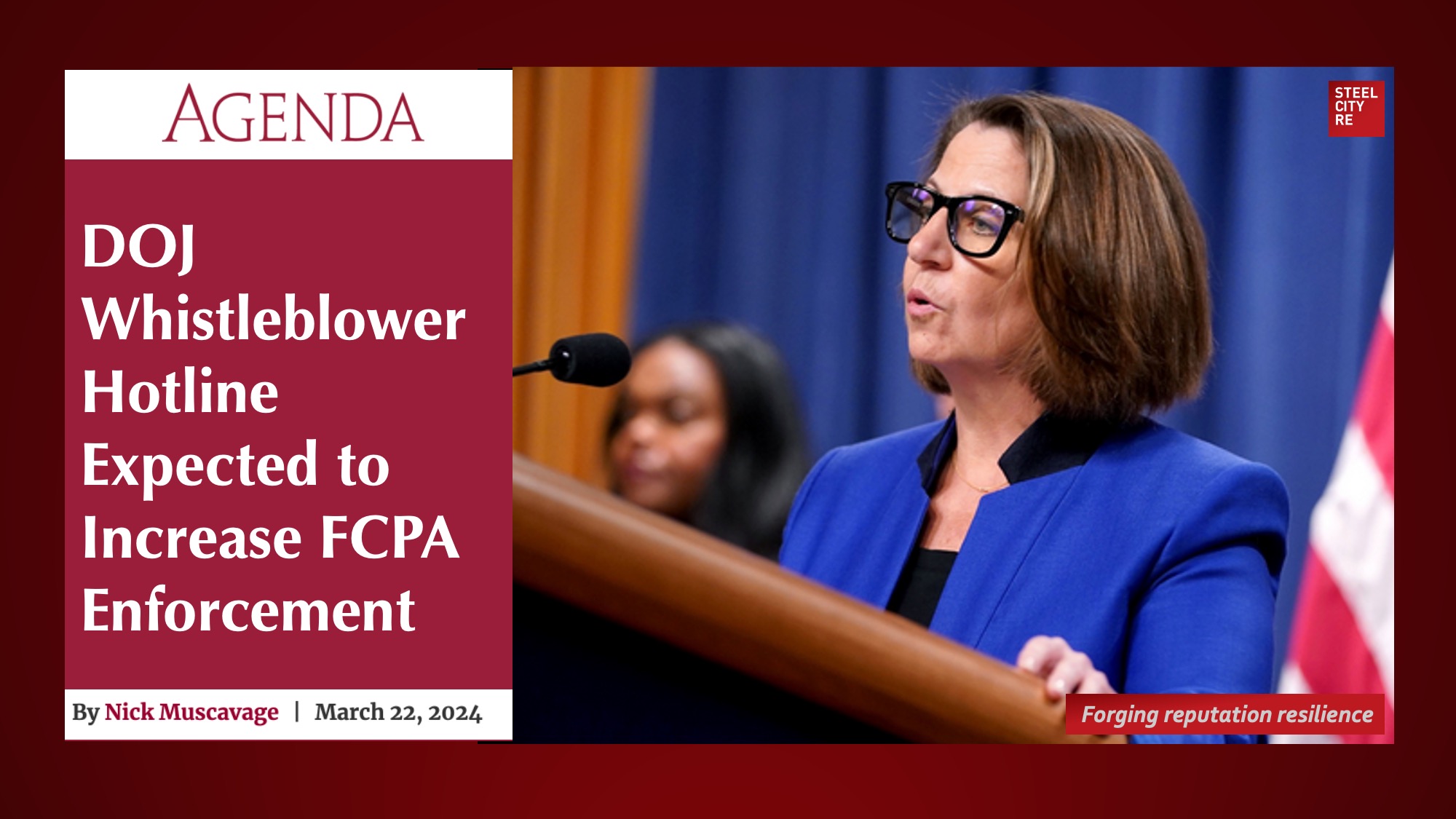DOJ Whistleblower Hotline Expected to Increase FCPA Enforcement
The new program “will create new incentives for individuals to report misconduct,” “If anything (said a defense lawyer), I think you’re going to see more scrutiny on this, […] And the risks are increasing.”
The increased risk of discovering an adverse event is not unlike placing an additional bullet in the chamber in a game of Russian Roulette. But with risks increasing to all companies, and risk being the basis for discounting value, all companies will be equally discounted. That will be hard to appreciate in a stock market that is soaring.
But as Warren Buffet famously said, you only find out who’s swimming with without shorts when the tide recedes, there will come a time when companies that have superior compliance programs–risk management programs–will stand out from among their peers…provided that stakeholders can appreciate and value those compliance programs.
That’s where we come in. With reputation risk forecasting, management, and insurance, Steel City Re helps companies build and prove to stakeholders their thoughtful risk management and dutiful governance over all that is mission-critical. It is an authenticated story stakeholders can appreciate and value.
Click on the image above to read more (No Paywall).

The new program “will create new incentives for individuals to report misconduct”
Agenda: March 25, 2024

About Steel City Re. With reputation risk forecasting, management, and insurance, Steel City Re helps companies build and prove to stakeholders their thoughtful risk management and dutiful governance over all that is mission-critical. The benefit is an insurance-authenticated story stakeholders can appreciate and value.
Reputation is Mission-Critical
Today’s sophisticated risk managers are strategic corporate talents, helping the C-suite and board meed stakeholder expectations for resilience. They know that enterprise damage from reputation risks might be their greatest and longest lasting peril, so they monitor for red flags. They foster a culture that respects those warnings and facilitate processes to mitigate those risks. Their diligence strategically builds enterprise-wide resilience that informed stakeholders can appreciate, and they use insurance two ways: operationally, to foster resilience; and strategically, to authenticate their thoughtful risk management and dutiful governance systems.
The results of strategic reputation risk management are evident in reputation resilience. More than crisis recovery, they include customers buying, not boycotting; employees working, not fleeing; investors buying, not selling; lenders adjusting interest rates down, not up; regulators deferring, not enforcing; and social license holders acquiescing, not protesting.
Having a robust Reputation Resilience Program in place offers, amongst other benefits:
- Protection for the company, its staff, executives, and board from litigation and regulatory challenges
- Improved governance processes and better enterprise risk management protocols; i.e., measuring reputational risk
- Establishment of an agile operating, communications, and decision-making team, with clear roles and responsibilities, trained and ready to handle all reputational threats; i.e., a reputation risk management framework
- Proactive management of risks that could give rise to delays or derailing concerns around new product and strategic partnership launches
- Captured behavioral economic value from stakeholders; i.e., value of reputation
- Reduced costs of debt and risk transfer while boosting equity value; i.e., boosting reputational value
A hazard of reputation risk is a lurking gap between stakeholder expectations and reality. Another hazard is the emotional intensity associated with expectations. The expected surge in litigation in 2024 around environments, social and governance issues reflects both that emotional intensity and is one manifestation of the anger from disappointed stakeholders. This video explains the behavioral economic features of the many perils of reputation risk.
Mitigating risk strategically through expectation management and operational adjustments evinces thoughtful management and dutiful governance. Financing such risks evinces prudence, and doing so publicly enables stakeholders to appreciate and value the effort.
One Question
Reputation risks are prevalent, material, and place both corporate viability and profitability at risk. Is enhancing and promoting the quality of your risk management program part of your strategy?

